Keywords (also known as SEO keywords, keyword phrases or search queries) are words or phrases that are searched online.
Keyword research is the process of finding and analyzing search terms (keywords) with the goal of using that information for SEO and marketing purposes.
Carrot’s Keyword Explorer can help you do keyword research and find high-intent keyword phrases to target as part of your evergreen SEO strategy.
In this tutorial, you’ll learn the basics of keywords and keyword research. Here’s what we’ll cover:
- Why Is Keyword Research Important for SEO?
- Are Keywords Still Relevant in 2025?
- Different Types of Keywords and Search Intent
- Page Topics & Keyword Groups
- Entity-Based SEO
- Localizing Your Keywords
- How to Do Keyword Research
- Tracking Your Keywords
Without further ado, let’s get into it!
Why Is Keyword Research Important for SEO?
Keyword research is the process of discovering words and phrases (aka “keywords”) that people use in search engines like Google, Bing, and YouTube.
Keywords are simply phrases people are typing into search engines to find what they’re looking for. By knowing what people are searching for online you can get in front of them where they’re already going. This takes the guesswork out of the SEO and PPC marketing process.
Keyword research impacts every other SEO task that you perform, including finding content topics, on-page SEO, blog strategy, and content promotion. That’s why keyword research is usually the first step of any SEO campaign.
Also, researching keywords can help you better understand your target audience. That’s because keyword research gives you insight into what customers are searching for… and the exact words and phrases they use. In other words: keyword research is market research for the 21st century.
Carrot’s website templates are optimized out-of-the-box for keyword phrases relevant to the site type you’ve selected, and you can use Carrot’s Keyword Explorer to further customize your site and beat the competition.
Are Keywords Still Relevant in 2025?
While keywords and keyword research have evolved over the last few decades, they are still very relevant to SEO and evergreen marketing.
Instead of thinking of keywords as single words or phrases, these days it’s important to understand the different types of keywords and the search intent behind why someone is looking for those types of keywords.
Rather than keyword stuffing or repeating one exact version of a keyword phrase over and over on a page, you should optimize website content based on topics. We’ll discuss this in more detail below and talk about how you can group related keywords together.
ℹ️ Keyword stuffing is an outdated and ineffective SEO technique where keywords are excessively and unnaturally repeated in content, meta tags, and alt text. This practice is penalized by search engines because it provides a poor user experience and manipulates search rankings.
Different Types of Keywords and Search Intent
When doing keyword research and optimizing a page on your website, it’s important to understand the different types of keywords and the reasons why people are searching for those types of keywords.
Each type of keyword has a different search intent or reason why someone is searching for something online:
- Navigational (Brand / Commercial) Keywords
- Used when someone is searching for a specific website, company or brand by name
- Optimize your About and Reviews pages for these keywords
- Quickest wins, since the person searching is already aware of your company
- Examples:
- Company name [location]
- Smith Brothers Roofing reviews
- Transactional Keywords
- Used when someone is ready to make a purchase or take action soon
- Optimize your location pages and/or service pages for these keywords
- Likely to convert to a lead, since the person searching is ready to solve the problem
- Examples:
- 24 hour plumbers near me free estimates
- sell my house fast [location]
- Informational Keywords
- Used when someone is searching for information or trying to answer a question
- These are often long-tail keywords and make great topics for blog posts
- Less targeted visitors who may or may not be ready to convert to a lead or customer yet
- Examples:
- what temperature should i leave my ac on while on vacation in arizona
- can i sell my rental property with tenants in it in california
Each type of keyword and search intent is important to your business in different ways.
Page Topics & Keyword Groups
ℹ️ A keyword group is a collection of related keywords that share a similar user intent. Grouping keywords helps to organize your SEO efforts by targeting a specific topic or theme rather than individual keywords, leading to more comprehensive and effective content.
Google is clever enough to know that “Sell my house fast” and “Sell your house fast” are the same topic and valuable to the same target audience. Likewise, “air conditioning repair” and “air conditioner repair” have the same meaning and search intent.
Rather than creating 2 different pages on your website for these keyword phrases that mean the same thing, you’ll want to combine similar keywords together into a topic aka keyword group.
Each page or blog post on your website should focus on one main topic / keyword group.
For each topic, you’ll pick a primary keyword phrase to focus on for on-page SEO. We’ll discuss this more below (under How to Do Keyword Research).
If there are synonyms of the primary keyword that have the same meaning and search intent as your primary keyword phrase, you can also include these secondary keyword phrases throughout the same page.
Together, the primary and secondary keyword phrases are part of a keyword group (also known as a keyword cluster or keyword family). Here are a few examples of keyword groups:
- Real estate investor example:
- sell my house fast, sell your house fast, cash home buyers, cash for my house, sell my house for cash, how to sell my house for cash, we buy houses, etc.
- Real estate agent example:
- real estate agents, real estate agents near me, best real estate agents Sacramento, find a realtor, local realtors, realtors near me, etc.
- HVAC example:
- air conditioning repair, air conditioner repair, ac repair services, hvac repair, air conditioner repairman, air conditioning service, etc.
🚨 Note: You only need to create 1 page for each topic. Creating multiple pages for keyword phrases that are synonyms will cause the pages to compete with each other, aka keyword cannibalization.
Entity-Based SEO
Just like Google has gotten smart enough to understand that very similar keywords mean the same thing, their algorithms have also gotten better at understanding the meaning of topics, aka entities. An entity is typically a person, place, organization, thing, or concept.
Many words or phrases may have different meanings, depending on the topic. Entity-based SEO is a way to optimize your website and pages so that Google clearly understands your topic, aka entity.
It takes keywords and keyword groups one step further by providing additional related words to help Google understand the meaning behind your topic/entity.
For example, if someone searches for “Apple,” they could be looking for the fruit or the tech company. A webpage about “apple” the fruit might also include related words like: “fresh, delicious, granny smith, gala, varieties, nutrition” etc. A webpage about the tech company Apple might also include words like: “computer, iPhone, laptop, store, tv, watch, products, iPad” etc.
If someone searches for “AC repair,” they could be looking for residential services or to fix the AC in their car or truck:
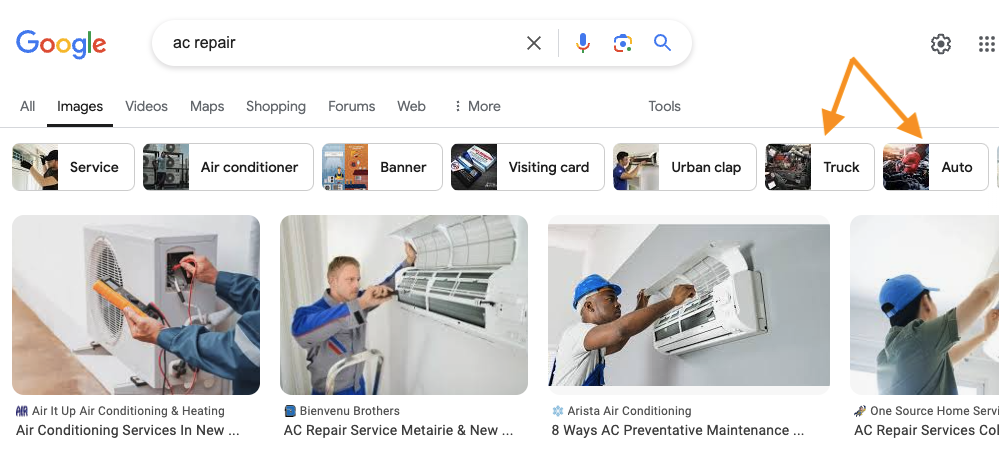
If you own a residential HVAC company, you’ll want to include additional related words that help Google and users understand that you repair AC in people’s homes, not in their automobiles. For example: “home, residential, services, repair, broken ac unit, window AC, central ac unit” etc.
Similarly, as a real estate investor, you might specialize in buying fire-damaged properties.
A search in Google for “fire damage” shows that this phrase has different meanings. It could be about fire-damaged homes, other fire-damaged buildings, restoration services, or about fire damage in popular role-playing games:
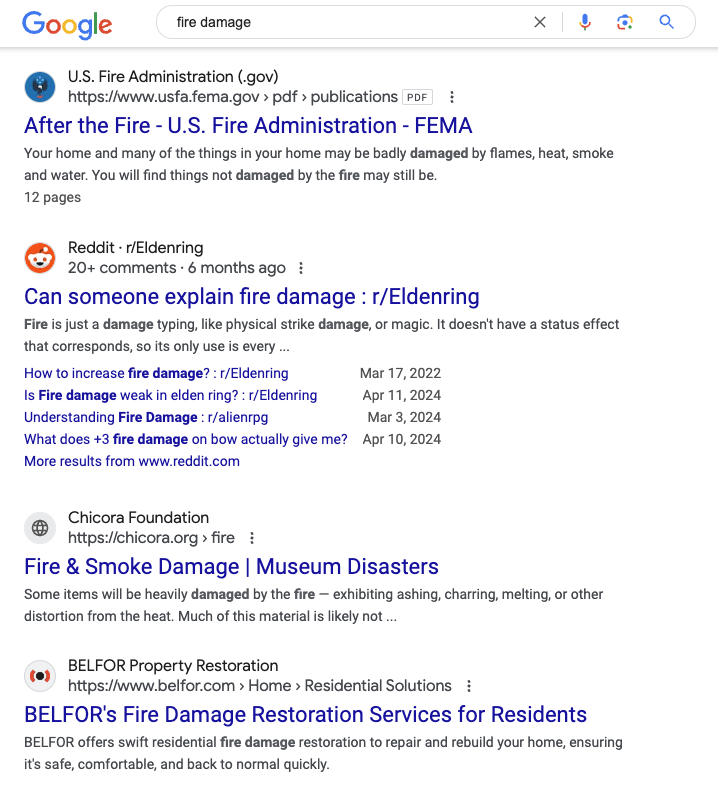
In this example, you’ll want to include related words on your website to make it clear what type of fire damage you’re focused on.
To find related words for entity-based SEO, you can turn to the Google Search results:
Enter a keyword phrase in Google Search. Check the top bar of suggested searches for words that fit your business:

You can also click on the Google Images results and check the top bar of suggested image searches for more words that are relevant to your business:
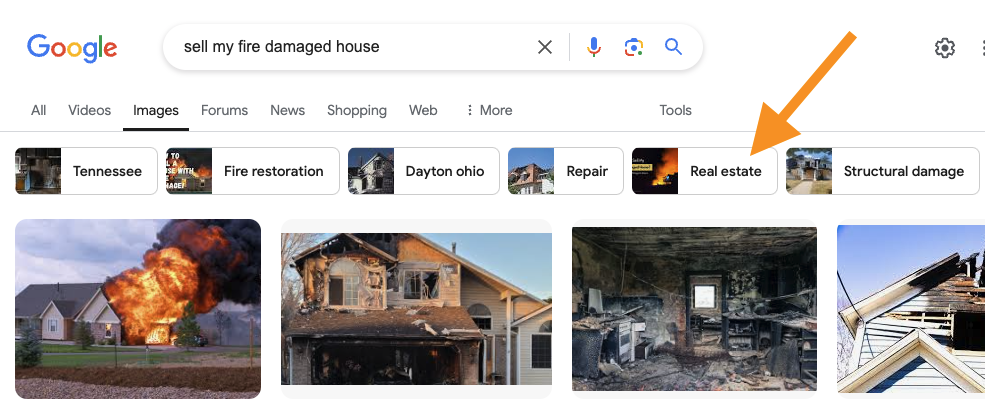
Follow the steps above for the different phrases in your keyword group. Include the relevant words you find through this process in your website’s content.
Here’s a few more tips about entity-based SEO:
- We don’t recommend adding a direct competitor’s name to your content, even if it appears in the Google search results for your keyword phrase.
- Entities and related words can vary by location. That’s why it’s important to look at the Google search results and consider what related words and phrases might be important to your customers, clients and business.
- All things being equal, the page that does the best job of describing the entity via relevant keywords and phrases wins. It’s not about keyword stuffing, but instead about clearly conveying the meaning and context of your topic.
Localizing Your Keywords for Better Results
Once you have chosen your keyword groups and additional related words, you can add localization to help direct Google to show your webpages to leads in specific geographic areas.
Localization simply means adding a specific geographic location (like a city or state name) to a more general keyword phrase. For example:
- sell my house fast detroit
- central ac repair tucson az
Adding localization enables Google to rank your page against others in the same geographic area. It can also help your page appear for “near me” search queries.
Localization is not a requirement for all pages or topics, but it can be especially helpful for keyword phrases and topics that are very competitive and/or topics that are particularly valuable to your business.
Your localization strategy will depend on your business model and goals. A business that only serves the metro area of 1 city is different from a company who wants to attract leads nationally.
Learn more about determining your location focus and our location page strategy:
How to Do Keyword Research
Step 1 – Research
Using a keyword research tool such as Carrot’s Keyword Explorer, look up the phrases you think your ideal leads, clients or customers might type into Google to find your business and the services you offer:
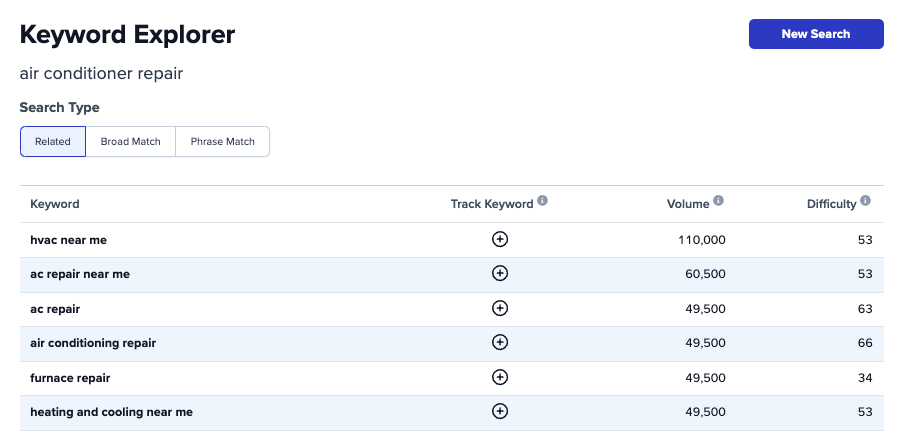
Simply type in the main topic of your page or a keyword related to that topic that you think people will be searching for.
Our Keyword Explorer tool will give you a list of related keywords along with volume & difficulty:
- Volume shows you an estimated number of times that people are searching for that phrase each month in the U.S.
- Higher volume = more people searching those keyword phrases
- Difficulty tells you an estimate of how easy or hard it will be to rank in the first page of Google for this keyword, from 0 (Easy) – 100 (Very Difficult)
- Higher difficulty = more competition for those keyword phrases
You can also use the Keyword Explorer to search by domain. This is particularly useful if you want to find out what keywords other websites or your competitors are ranking for:
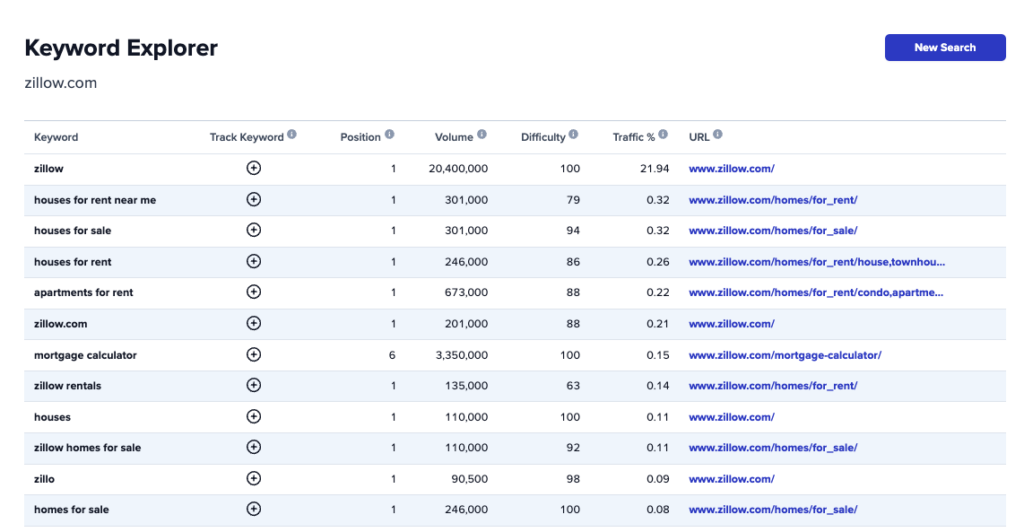
Create a simple list or spreadsheet and make note of the keyword phrases that seem most relevant to your topic.
A few things to note when evaluating keywords:
- Ideally you’re looking for the sweet spot of low difficulty and high volume keywords.
- Keywords with low to medium difficulty will be faster & easier to rank.
- You may find that many low volume keywords can often be easier to rank.
- Just because a keyword doesn’t have a ton of searches each month, doesn’t mean it’s not worth trying to rank for – especially if you have a newer website. It depends on how relevant the topic or keyword is to your business goals.
You should also be mindful of search intent and alternate audiences.
For example, when researching the keyword “real estate agent” you’ll find evidence of people searching for real estate agents to help them buy or sell a home, but you’ll also find searches from individuals hoping to become real estate agents:
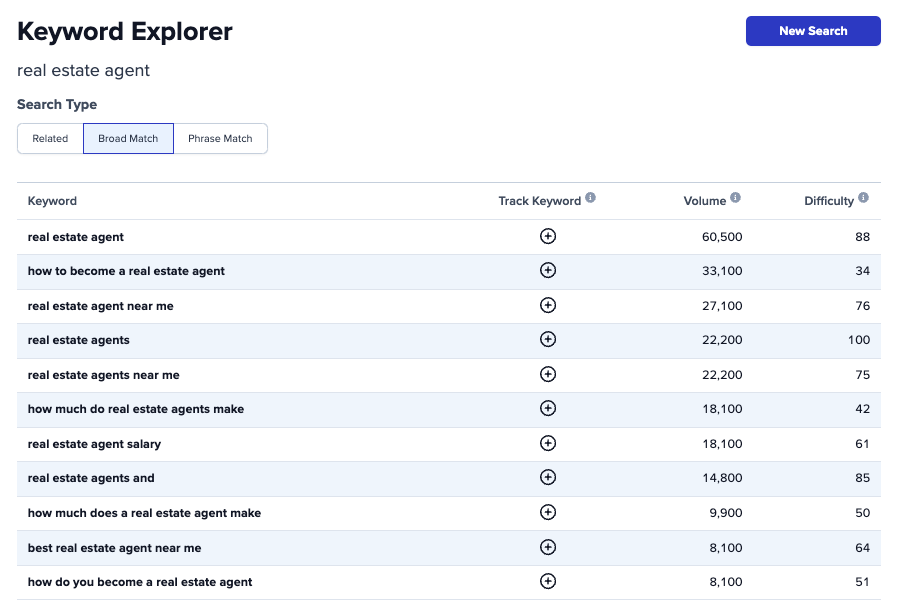
You can use entity-based SEO (discussed above) to add other related words to your website’s content and help Google understand who your page is for.
Step 2 – Create Keyword Groups and Narrow Down Your List
Once you’ve made a list of possible keywords, gather similar keywords together into keyword groups.
Remember, you only need to create 1 page for each topic, so any keywords that have the same meaning and search intent should be grouped together.
Using the Volume and Difficulty data provided by Keyword Explorer, you’ll want to pick 1 keyword phrase as your primary keyword phrase that you’ll use for most of your on-page optimization.
Tips for picking your primary keyword phrase:
- If possible, aim for the sweet spot of low-medium difficulty and reasonably high volume.
- Make sure that the search intent for the keyword matches who you’re trying to attract to your page.
The highest volume doesn’t always mean the best match for you and your site.
For example, “realtor” has a volume of nearly 3 million but has a 100 difficulty score and may inadvertently pull other target audiences to your site. You will need to have VERY good content and a LOT of backlinks to compete for these types of phrases. “Real estate agents near me” has a volume of 22,000 and only 75 in difficulty and will target a more specific audience. You can use localization (discussed above) to capture searches for “near me” in your local area.
When choosing your primary keyword phrase, keep in mind the search intent and motivation behind why someone is using that search phrase.
For example, “sell my house fast” will attract more general and less motivated leads than “cash home buyers.” Nearly everyone wants to sell their home quickly, but including “cash” in the search phrase indicates that person is willing to explore options that may not involve a mortgage or real estate agent.
The rest of the keywords in your keyword group will be your secondary keyword phrases and related words that you can use for entity-based SEO to make sure that your website’s visitors and Google understand what your content is all about.
Watch the video below or read our Keyword Explorer tutorial to learn more about doing keyword research:
Download the free keyword research worksheet mentioned in the video:
Tracking Keywords for Your Carrot Website
Once you’ve done your keyword research and optimized your pages accordingly, you’ll also want to track your results. We’ve made this easy with our Keyword Rank Tracker.
While using the Keyword Explorer, you can add keywords directly to your Rank Tracker simply by clicking the ➕ icon in the ‘Track Keyword’ column:

ℹ️ Learn more about using Carrot’s Keyword Rank Tracker
How to Pick your First SEO Keywords
With a million keywords to rank for in Google, how do you decide what’s going to generate you the most leads? In this video, Trevor & Brady share a simple & powerful method for keyword research if you’re just getting started with SEO:
Conclusion
The keywords you choose to target with your search engine optimization on your website are one of the most important parts of getting results with SEO.
The next step is using the keyword phrases and related words you’ve found through your research for on-page SEO.


